PRATICAL REASON, MORAL AND LAW
DOI:
https://doi.org/10.5216/phi.v13i1.7623Keywords:
Practical reason, subject, moral, fact of reason, doctrine of lawAbstract
The Kantian philosophical legacy, outlined with the resources of critical metaphysics, will only maintain a separate identity for posterity, if their architectural interfaces were semantically demarcated, the objects, methodologically aforesaid, and the problems correctly solved. In the context of practical reason, Kant philosophical performance answers to a doubly forked meaning of obligation and legislation, say, to consider man as auctor obligationis and, simultaneously, as subjectum, and then to examine, on the one hand, its numerical identity as an actor of obligations and, on the other hand, face the same subject as support of rights, set against externally to the first in the figure of a subject of rights.Downloads
Downloads
Published
How to Cite
Issue
Section
License
Authors who publish in this journal agree to the following terms:
- Authors retain copyright and grant the journal right of first publication, with the work simultaneously licensed under a Creative Commons Attribution License that allows others to share the work with an acknowledgement of the work's authorship and initial publication in this journal.
- Authors are authorized to enter into separate, additional contractual arrangements for the non-exclusive distribution of the journal's published version of the work (e.g., publishing in an institutional repository or as a book chapter), with an acknowledgement of its authorship and initial publication in this journal.















